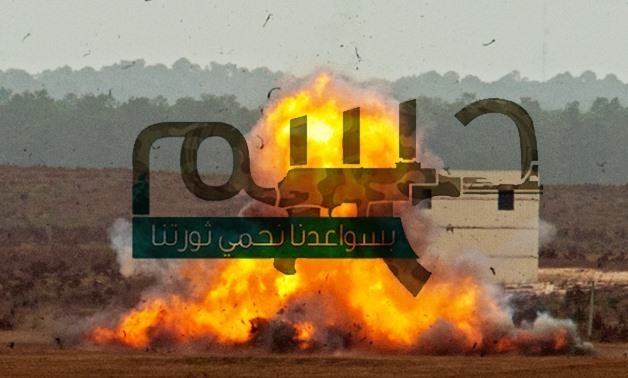
FILE - Hasm Movement logo
CAIRO – 12 July 2018: A subcommittee on national security in the House of Congress held a hearing session on Wednesday to discuss any existence of a Muslim Brotherhood’s (MB) threat to the United States and its interests and effective ways to counter it.
A senior Fellow at the Hudson Institute and director of its Center on Islam, Democracy and the Future of the Muslim World, Hillel Fradkin, stated on his testimony that “The Brotherhood certainly means to be global and it means to be a threat. More specifically the Muslim Brotherhood is devoted to a political and religious project that in principle, in its essential character and goals, is hostile to other forms of politics, including our own. And it means for this project to be global in extent.”
He added that the Brotherhood is for the present a broken organization in Egypt, but it has sustained defeats before, partially by finding bases elsewhere and this meant Saudi Arabia in the 1960’s and today it means Turkey and Qatar, noting out that Aymen al Zawahiri, the present head of Al Qaeda expressed nostalgic appreciation for the fact that Al Qaeda had been born out of the Brotherhood project and welcomed its members to join his own.
“The Muslim Brotherhood is often correctly described as a gateway to extremism and jihadism. Its ideology is xenophobic, bigoted, and totalitarian. And although its various branches all seek to promote this ideology, they differ in terms of their preferred tactics. Specifically, some of its branches are violent and some are not”, witnessed the Senior Vice President of Research for the Foundation for Defense of Democracies Jonathan Schanzer.
Schanzer added that Muslim Brotherhood operates in as many as 92 countries and its ideology is widely viewed to be the gateway to jihadist violence. Moreover, the leaders and adherents to al-Qaeda and the Islamic State have drawn inspiration from al-Banna, Qutb, and other Muslim Brotherhood thinkers.
President and founder of the American Islamic Forum for Democracy (AIFD), Zuhdi Jasser, stated on his testimony that “No group embodies the threat of radical Islamism more than the Muslim Brotherhood (MB), and no group runs deeper into the consciousness of global Islamism, especially in our Arab Sunni communities than the Muslim Brotherhood and its global network of affiliates and progeny across the world. Unfortunately, much of the conversation about the Muslim Brotherhood has been obstructed, muffled, marginalized, deferred, or minimized by Muslim Brotherhood sympathizers or their allies.”
He noted that Muslim Brotherhood recently called for jihad on the U.S. and Israel, adopting a view almost identical to Al-Qaeda’s.
He gave evidences of the terrorism of Muslim Brotherhood saying that Morsi allegedly agreed to grant a presidential pardon to over 20 terrorists including one of the lotteries childhood friends who was running Ansar Bayt-al-Maqdis, an ISIS branch in the Sinai and that 14 Morsi’s brother mediated the initial contacts between Al-Zawahiri and Morsi himself.
He added that “On January 27, 2015, the Muslim Brotherhood published on their official Ikhwanonline.com website an announcement that the organization was entering a "new phase" and calling its followers to prepare for a "long, uncompromising jihad" against the Egyptian government.”
On May 27, 2015, they called for a retribution punishment against government officials, judges, police, soldiers, religious officials, and media personalities backing the government, he added.
Daniel Benjamin, the Director of the John Sloan Dickey Center for International Understanding at Dartmouth College since 2013, contradicted on his testimony the other three researchers saying that the Muslim Brotherhood doesn’t impose a global threat and that most of the groups that are said to be Muslim Brotherhood affiliates or franchises support democracy and abjure violence.
“The Egyptian Brotherhood has foresworn violence since the 1970s, and there is no compelling evidence that it has reversed course on that issue. It is noteworthy that two Egyptian MB splinter groups, Liwa al Thawra and HASM, were designated early this year under Executive Order 13224 as terrorist organizations, and both do indeed have a record of violence. It is, however, fallacious to say that this is a sign of the Brotherhood’s return to violence. These groups appear to have split off because their members wanted to commit violence while the Brotherhood as a whole did not”, he added.
The State Department has designated two Brotherhood-affiliates HASM and Liwa al-Thawra — and Hamas’ political leader Ismail Haniyeh, as Specifically Designated Global Terrorists (SDGT) under an executive order.
The Muslim Brotherhood was designated as a terrorist group in 2013 after committing several terrorist attacks to destabilize Egypt and incite interior chaos.

Comments
Leave a Comment